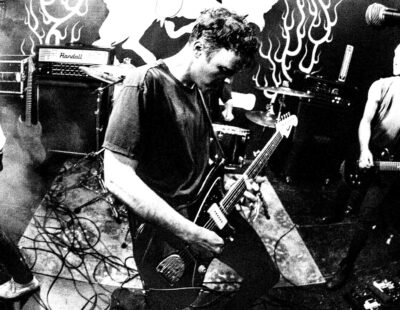So, maybe your metal band ain’t destined for a multi-million dollar CGI family film. There are still opportunities to license your music for movies, TV and other audiovisual media. If you’re serious about it, you’ll need to cozy up to music supervisors (they’re paid to find the perfect music for a project) and licensing specialists (who pitch music for said project). For Decibel issue 111’s Killing Is My Business column, I interviewed Sam James Velde and Jeff Gray, two dudes with a lot of experience in both of those areas.
What exactly is your role in the whole licensing/supervising process?
Sam: In a nutshell, I music-supervise various projects. I just finished working on two films, one for Teton Gravity Research called Way of Life and one for Roger Gastman about the ’80s DC “go-go” scene called The Legend of Disco Dan. I also pitch independent music to music supervisors for all types of media (film, commercials, web, etc.). I helped create a licensing department for Fearless Records, so their music was out there and being actively pitched and recognized.
Jeff: My role is dependent on the needs of the production I work on/have worked on. For MTV and Fox Sports, my position is defined as Music Clearance/Licensing. The role is to support a music supervisor/producer or even an editor in acquiring the rights to the compositions and master recording (collectively, a “song”) for synchronization within a program. Many times these are referred to separately (and erroneously) as “master” and “synch,” but the composition rights and master recording rights are both synchronization (synch) rights, and “synch” is not a synonym for “composition.”
There are various instances where the master recording rights are not necessary to obtain, but the majority of uses require clearance of them. Sometimes, regardless of title, the roles get skewed or reversed. Many times I’m asked to participate in the creative process to identify a song that would fit a particular scene or to provide replacement suggestions for songs that may be unavailable for synchronization. Because many music supervisors do their own music clearances and music clearance persons often provide creative “music supervisor” work for productions, it’s adequate to unofficially declare one’s role is in music supervision if you are comfortable with it.
What sorts of licensing opportunities or types of A/V projects are most open to metal or extreme music acts? Which tend to be off-limits?
Sam: In most cases, anything involving high action… action sports and video games particularly. Most commercials want music that are very accessible and easy on the listener.
Jeff: What I’ve found are the typical, cliché projects someone familiar with the genre may notice: sports, extreme sports programs, heightened emotional scenes (e.g. anger) or even simple reference music (a featured person who is into metal music). Generally, metal and extreme music have a potential place anywhere there is aggressive footage/editing that benefits from the genre of music. It’s mostly male- dominated vocals (if any vocals are used). However, if a featured person in a video piece is female, most likely they will use a metal song with female vocals. Often the instrumental versions or sections of metal songs are most desirable. It’s important to have fully-mixed and mastered instrumental versions of your songs. It’s become an industry standard, and can at least double the potential that your music can be exploited for financial gain on your part.
What types of projects tend to be the most rewarding in terms of up-front (synch) fees? Can you give a ballpark range that you’ve seen for those types of projects?
Sam: In the case of pitching music, all placements are great, because you are essentially helping the artist become recognized. Having a high synch fee is great, too, of course, because everyone benefits monetarily. Video games have been the most rewarding for both aspects. The money changes from project to project. But let me say this: some can have BIG dollar signs attached.
Jeff: In the examples of Fox Sports and MTV, the promo use is always the most financially rewarding in regards to licensing fees. Think of promo uses as commercials for upcoming programs. Since the music used in the promo is integral to the promotion of the program, will be aired possibly dozens, hundreds or thousands of times and becomes associated with the advertisement, the synchronization fees will generally be higher than a synchronization in a program that uses lots of other music and doesn’t air as much.
The fees paid for promo use more critically depend on how the song will be used or associated, how long the promotional period is (because the amount of airings during the promo are unlimited) and where the promo will be broadcast (e.g. worldwide, only in the United States, only on local pay cable TV, etc.).
As a hypothetical example, let’s say a catalog song by a well-known artist, like “Hungry for Heaven” by Dio, is used in a promo for a high school wrestling program (the song was previously used in Vision Quest, a movie about a high school wrestler) and airs worldwide for three months. It would not be out of the ordinary for a total quote for the song to be $50-$100k. For a newer artist and song that has no association with a wrestling film, the fee may be something like $8-$20k.
Are there reasons why a young band might want to accept a placement even if there’s little or no money up-front? Are there reasons why they might want to hold out?
Sam: If the exposure is so great they can’t pass it up, they should do it, but never devalue the worth of your song for it.
Jeff: Yes. If the network that airs the program has obtained performance licenses from the three American performing rights societies [PROs, covered in issue 110], then the use of your song will get recorded on a cue sheet and submitted to the PRO for potential performance income. The amount of potential performance income from the use will depend on the length of the use, type of use (vocals or no vocals), where it’s used (opening credits, background music, etc.), what time it airs, how many times it airs, and more.
There is of course always the potential of “exposure,” meaning people may discover the song from hearing it in a program and may enjoy it and be compelled to purchase it, find out about the band, see the band live if they are touring or buy merchandise from the band. Exposure is an immeasurable, volatile, arbitrary currency, so I don’t recommend banking on any income as a result [of exposure alone]. You should be comfortable with the use and have a desire to participate with a production that has little or no budget for music. My opinion is that if a production has money to buy donuts then they can provide at least some upfront fees for music licensing.
It used to be that bands considered getting their music placed to be unethical or “selling out.” Are things different now?
Sam: Depends on the artist, really, and what they want to endorse or have their songs represent.
What kinds of new licensing opportunities have emerged for extreme acts over the last decade?
Jeff: I think that extreme metal has certainly become more mainstream and accepted as a legitimate genre of music that “normal” people enjoy. Previously it was newer and scary and not as accepted. Comedians like Brian Posehn and professional sports players openly admit their love of metal and extreme metal, and that has also helped bring the music genre in to more mainstream commercial potential. Overall, there has been a huge place for extreme metal in the licensing world for video games, and A/V shows like Metalocalypse have opened doors for more extreme metal in television. While that show doesn’t license outside music (they compose it themselves), it certainly influences others who love the genre and know they can request commercially-available extreme metal for their programming.
For a young band, what’s the advantage of working with a professional licensing specialist vs. reaching out to music supervisors/project managers directly?
Sam: We have relationships with music supervisors that have been built up over time. They come to us looking for music. Otherwise you might just be another band in a sea of millions.
What’s the first step that a young, unsigned/unpublished band should take if they’re interested in pitching their stuff to film/TV?
Sam: Making contact, really. Otherwise, see the answer above. Ha.
Jeff: If you’re doing it yourself from scratch, try to identify every place that is already licensing extreme metal (check sports programming, especially alternative sports like X-Games) and see if you can find resources online or through connections on how to approach offering your music as available for licensing.
You have to approach it like any other marketing plan for releasing a record or promoting a tour. If any of the business stuff doesn’t appeal to you then you can try contacting music libraries that represent music on your behalf for a cut of fees/profits derived. Remember that the people you’ll be sending music to for consideration are receiving music from hundreds, if not thousands, of other sources. You may never get a response, they may never listen to your music, and that will happen to people submitting even the most mainstream commercial music. If they have a need for extreme metal you may hear back from them at some point.
Can you give me a couple specific success stories of extreme music placements that you’ve negotiated?
Sam: There’s a bit of confidentiality to all of it, but let’s just say there have been a handful of bands that have been able to put a down payment on a van or finance a recording from certain placements.
Jeff: I have a long history of working with Victory Records for licensing music. They send me everything they put out. I’ve done deals where we make the whole catalog available for licensing use to music supervisors, producers and editors. I heard extreme music (instrumentals) from their catalog used as background music in various shows I’ve worked on, so it is appealing and useful to at least a few.
I’m not 100% certain what qualifies as extreme metal right now (I know it when I hear it) but aside from Victory or Sumerian Records pitches, most of my experience in licensing is from older, influential acts. I have licensed various Pantera songs multiple times, Diamondhead’s “Am I Evil” (directly from the band multiple times), and lots of doom metal like the Sword, Monster Magnet, The Desert Sessions.
What’s your all-time favorite metal placement in a film/TV show?
Jeff: There have been quite a few but my favorite and the most recent I can recall would be the opening credits for the film Zombieland where they used Metallica’s “For Whom The Bell Tolls”. It’s an iconic song from my youth and most of the songs from their catalog prior to The Black Album are seldom if ever used in film and TV, so the impact from my perspective is huge on more than one level.
Sam James Velde specializes in freelance music supervision and licensing. He’s also in LA bands Night Horse and Obliterations.
Jeff Gray has licensed metal (and less-important genres of music) for Fox Sports and MTV.







